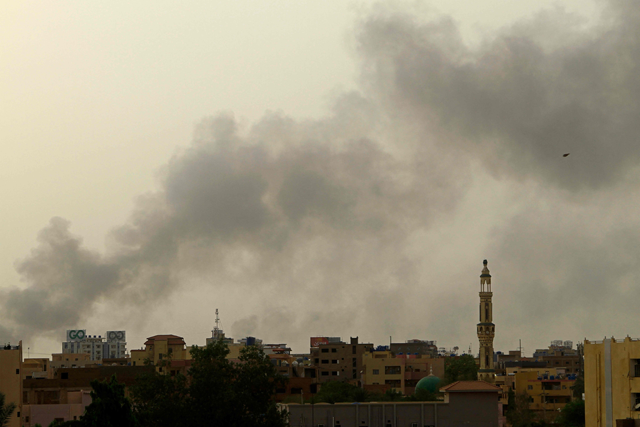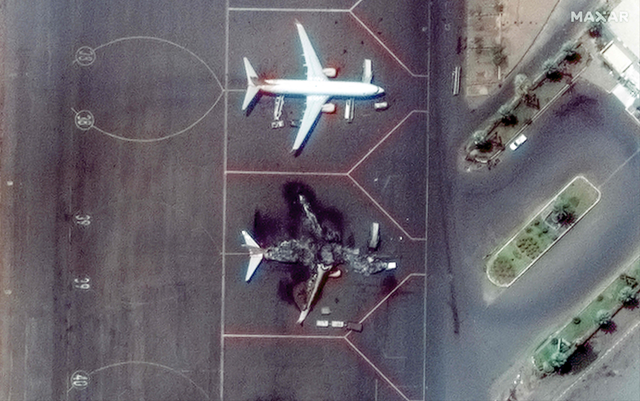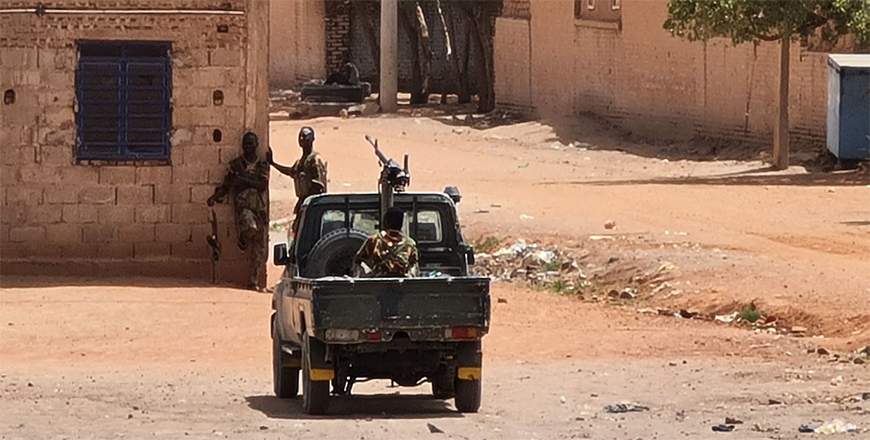You are here
Fighting rages in Sudan hours before truce expires
By AFP - May 29,2023 - Last updated at May 29,2023

Smoke billows over buildings in southern Khartoum on Sunday, amid ongoing fighting between the forces of two rival generals (AFP photo)
KHARTOUM — Gunshots and artillery fire rocked the Sudanese capital on Monday, the last day of a frequently breached ceasefire, as calls for civilians to arm themselves stoked fears the six-week war will intensify.
Residents told AFP they could hear street battles in northern Khartoum, as well as artillery fire in the south of the city.
Since the truce began a week ago, frightened residents have ventured out to try and get food or water, the costs of which they say have doubled since the start of the war.
But many families continue to shelter in place, rationing water and electricity while trying desperately to avoid stray gunfire in the city of more than 5 million people, nearly 700,000 of whom have fled, according to the United Nations.
In Darfur, on Sudan's western border with Chad, continued fighting "blatantly disregards ceasefire commitments", according to Toby Harward, of the United Nations refugee agency.
"Intermittent fighting between Sudanese armed forces and Rapid Support Forces in El Fasher, North Darfur over the last few days" has seen civilians killed, homes looted and tens of thousands newly displaced in the already war-ravaged region, Harward said.
Newborns dead
in hospital
The persistent fighting has impeded delivery of essential humanitarian aid needed by 25 million people, more than half the population, according to the UN.
A week ago, representatives of army chief Abdel Fattah al-Burhan and his former deputy turned-enemy Mohamed Hamdan Daglo, who commands the paramilitary RSF, signed a written agreement to pause the incessant air strikes, artillery fire and street battles in order to allow in much-needed aid and restore essential services.
But by the seventh day of the truce, due to expire at 9:45 pm (19:45 GMT) on Monday, no humanitarian corridors had been secured, and relief supplies had only trickled in, including to replenish the few hospitals that are still functioning in the capital.
In East Darfur state, more than 30 infants have died in a single hospital since fighting began, including “six newborn babies who reportedly died in one week alone due to problems including lack of oxygen amid electricity blackouts”, according to the World Health Organization.
Since April 15, at least 1,800 people have been killed, according to the Armed Conflict Location and Event Data Project. More than a million others are displaced within Sudan and nearly 350,000 have fled to other countries, the UN said.
Sudan’s neighbouring states — many already mired in instability — fear regional spillover and have pleaded for aid from the UN, itself reporting severe financing gaps.
‘Civil war’
On Monday the UN said Sudan has become one of the highest alert areas for food insecurity, requiring “urgent” action from the international community.
Aid agencies have also warned that with the rainy season approaching in June, parts of the country will become inaccessible, while the risk of cholera, malaria and water-born diseases will rise.
Sudan’s already fragile health sector faces compounded challenges, with three quarters of hospitals in combat zones out of service, according to the doctors’ union.
Even health facilities in areas largely untouched by fighting and looting are unable to replenish supplies as they scramble to serve an influx of those displaced by the war.
The army and the RSF have said they are willing to discuss extending the ceasefire, which US and Saudi mediators called for.
But Riyadh and Washington said “both parties are posturing for further escalation”.
Even with a potential extension of the truce, the UN warned of “growing reports of unexploded ordinances” in the capital and other densely-populated areas.
The governor of Darfur, a former rebel leader allied with the military, on Sunday called on civilians to take up arms.
This came after the defence ministry appealed for “army pensioners” and reservists to head to command units, while some members of tribes in the country’s east earlier demanded to be given weapons.
The Umma party, one of Sudan’s main civilian groups, cautioned against such calls which it said were “attempts to drag the country into civil war”.
Yassir Arman, a leader in the Forces of Freedom and Change, the pro-democracy movement sidelined in a 2021 coup led by Burhan and Daglo, on Monday accused officials from the former regime of military-Islamist strongman Omar Al Bashir of intending to “prolong the war, dragging civilians and tribes towards it”.
According to experts, Burhan is facing more and more pressure from his own Islamist supporters and remnants of the Bashir regime, with whom he had built a symbiotic relationship in order to gain power.
Arman warned that they are now seeking to capitalise on the chaos of war, preparing to position themselves as the stable alternative, thereby “restoring their lost paradise”.
Related Articles
WAD MADANI, SUDAN — Corpses littered the streets of a district of Sudan’s capital on Thursday, witnesses said, as the United Nations express
KHARTOUM, Sudan — Explosions rocked the Sudanese capital Khartoum on Tuesday as fighting that has claimed nearly 200 lives entered a fourth
KHARTOUM — Sudan's warring sides accused each other on Thursday of being behind breaches of the latest ceasefire that was negotiated by the


















